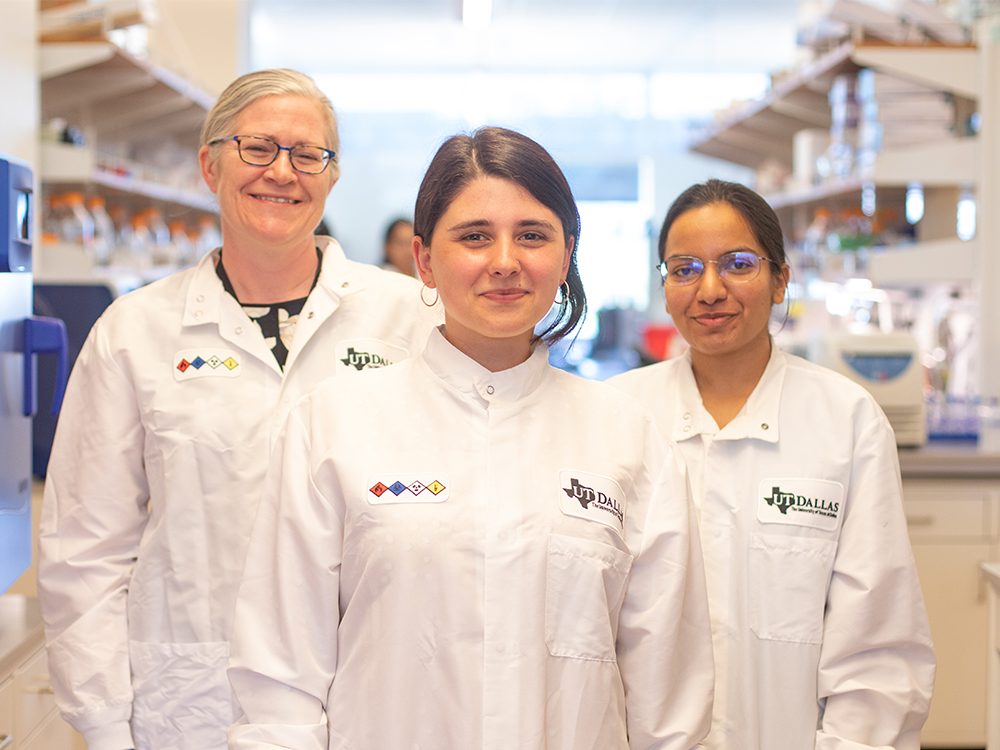Summer Program Bolsters International Research Ties
08.07.2023
 Georgian doctoral student Tata Ninidze (center) spent the summer in the lab of UTD’s Dr. Kelli Palmer (left) as part of a U.S. State Department program that supports academic research programs in the country of Georgia. Also pictured: UT Dallas molecular and cell biology graduate student Aparna Uppuluri, who works in Palmer’s lab.
Georgian doctoral student Tata Ninidze (center) spent the summer in the lab of UTD’s Dr. Kelli Palmer (left) as part of a U.S. State Department program that supports academic research programs in the country of Georgia. Also pictured: UT Dallas molecular and cell biology graduate student Aparna Uppuluri, who works in Palmer’s lab.
A two-year, $350,000 grant from the U.S. State Department to The University of Texas at Dallas recently enabled six doctoral students from the country of Georgia to visit campus for a summer program aimed at enhancing the scholars’ research and writing skills and facilitating scholarly partnerships.
The goal of the University Research Development Program (URDP) is to improve the standards of Georgian academic research in Georgian universities and to encourage greater interaction between Georgian and American academic researchers.
“We are a huge international campus,” said Beth Keithly, faculty grant and distinguished fellowships advisor in the Office of Graduate Education (OGE), which is one of the coordinating offices on campus. “Expanding our international reputation while creating opportunities for potential collaboration between international researchers is a good thing for UT Dallas.”
The URDP, sponsored by the U.S. Embassy in Tbilisi, Georgia, supports scholars studying economics, business, health sciences and computer sciences, as well as those in science, technology, engineering and math fields. In addition to OGE, the UTD International Center also helped organize the visits to Richardson.
Each of the Georgian students was assigned to a UTD lab or research group and a faculty mentor who is conducting research related to the student’s area of study. The scholars spent mornings in group training sessions, such as academic and grant writing, and afternoons working with their mentors and UTD students.
“We are now set up for more long-term work together because of this collaborative relationship that would not have been possible without this program.”
–Dr. Kelli Palmer, Fellow, Cecil H. and Ida Green Chair in Systems Biology Science at UT Dallas
Dr. Kelli Palmer, associate professor of biological sciences and Fellow, Cecil H. and Ida Green Chair in Systems Biology Science, studies how pathogenic bacteria acquire resistance to antibiotics. She hosted Georgian doctoral student Tata Ninidze, who investigated how Enterococcus faecalis becomes resistant to the antibiotic daptomycin.
Ninidze previously studied at the George Eliava Institute of Bacteriophages, Microbiology and Virology, which is renowned for its study of bacteriophage therapy as an alternative to antibiotics for treating infections. She will return this fall to Ilia State University, also in Tbilisi, where she expects to earn her doctoral degree by the end of 2024.
The Georgian student said the visitation program was a great opportunity for her and the other students.
“As we applied, we had to make sure we were a good fit with the professors,” she said. “It certainly was a good fit for me. I really enjoyed the program.”
Palmer said the State Department program helps academics on both sides.
“Tata worked at one of the famous phage institutes in Georgia, so I have a lot to learn from her in that regard. On the other hand, our lab offers more molecular biology experience from which she can benefit,” she said. “We are now set up for more long-term work together because of this collaborative relationship that would not have been possible without this program.”
A different cohort of students will visit the UT Dallas campus next summer to conclude the program.
–Phil Roth
Tags: Graduate Education, International Center, NSM, Outreach